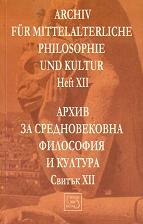Cognition and Perfection. The Doctrine of the Intellect of Albert the Great
Cognition and Perfection. The Doctrine of the Intellect of Albert the Great
Author(s): Elena MitevaSubject(s): Philosophy
Published by: Издателство »Изток-Запад«
Keywords: cognition; perfection; intellect; Albert the Great; medieval philosophy;
Summary/Abstract: In this essay the theory of the intellect will be regarded in its wider theological-philosophical context. In many of his writings Albert the Great defends the independence of the philosophical analysis1, so that his writings could even be regarded only from the perspective of their philosophical significance.Yet such a consideration would omit the question why a theory of the intellect could be of personal importance. The Christian background of Albert’s speculation should be considered if our aim is not only to point his historical importance, but also to learn something from him. The theory of intellect is considered as the concentric point of the entire doctrine of Albert the Great. It appears to be the centre and basis for those existential questions, which every thinking and faithful person faces. Because, if happiness was the aim of human existence – and for a believer happiness could only be realized beyond this world – and if the way to happiness starts from our innermost essence, then the main question – and not only as a philosophical or theological question, but rather as a disturbing existential one – should be about the constitutive principle of that essence: the intellect. The intellect constitutes the definition of a human, as far as he is rational and mortal being.
Journal: Архив за средновековна философия и култура
- Issue Year: 2006
- Issue No: 12
- Page Range: 76-83
- Page Count: 8
- Language: English
- Content File-PDF

